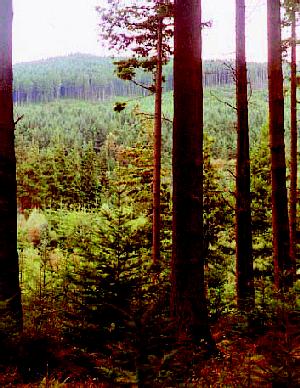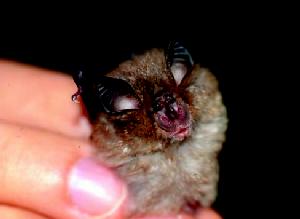| 2002 |

|
YEAR BOOK |
COILLTE TEORANTA
|
Research supports Coillte’s commitment
to sustainability
|

Low impact silvicultural systems
Currently clearfelling is the predominant silvicultural system used in Ireland. Under this system, all trees are removed from a site when they mature leaving the ground bare and ready for planting the next crop. The system is very efficient for timber production but its impacts can have dramatic effects on both the visual landscape and on plant and wildlife habitats within the forest. Alternative systems to clearfelling have been traditionally used on the European mainland but have not found favour with Irish foresters because of the perceived increased risk of storm damage to forests. These low impact silvicultural systems, while more difficult to manage, maintain a continuous forest cover with a multiple age structure. They lessen the impact of harvesting on the landscape, create greater diversity within the forest, and generally have many beneficial effects on the environment. The potential of these systems is now being reappraised both in research trials and at a pilot scale in commercial conifer plantations with the view to providing alternatives to clearfelling in areas of high sensitivity.

Nature conservation
One of the key requirements of Sustainable Forest Management is that biological diversity of forest ecosystems be maintained and enhanced as an integral part of forest management objectives. Coillte is currently undertaking an ambitious nature conservation programme that involves:
-
designating 15% of its forest estate that
will have nature conservation as the
primary management objective;
-
providing deadwood habitats across the
forest estate;
-
undertaking a restoration programme for
native woodlands and selected blanket
bogs in Special Areas of Conservation;
and
-
developing Biological Action Plans for
species for which Coillte has special
stewardship – e.g. lesser horseshoe bat.
Chemical reduction
The use of chemicals in forest ecosystems is a controversial issue. While seen by many as undesirable, practicalities are such that a totally organic approach is difficult to achieve. Factors such as cost and availability of labour, heavy vegetation growth and the damage caused by the large pine weevil to newly planted trees necessitate their use. Forestry uses only a fraction of the total annual pesticide use in this country (estimated at 1%) and is applied to a site only twice during a 40–50 year period. Coillte has, however, undertaken to reduce its chemical usage over time with the view to eventual elimination, if feasible.
This decision is presenting both researchers and operations staff with serious challenges as to how best to establish plantations in a cost efficient way, with minimal or no use of chemicals. Research is currently underway investigating alternative methods to current practice that will reduce the chemical load on forests. These include the use of biodegradable plastic mulches, vegetation growth suppressants, and the centralised treatment of plants in the nursery against the pine weevil.
Monitoring
Sustainable Forest Management requires that forests and forest operations are monitored to detect potential impacts on the environment and also to track any changes in the ecological or health status of forests over time.
Monitoring forest operations is now becoming routine with the company’s laboratory – providing direct feedback to forest managers on the impacts of their operations, through the provision of analytical services. Water analysis is a particularly useful tool in this respect, as it can rapidly reveal the effects of poor or inappropriate practices. Nutrient run-off, sediment movement and erosion, which can impact on fisheries, can be readily detected through water analysis.
Annual surveys are also carried out on forest health. These are undertaken as part of a pan European programme to monitor the condition of forests across the Member States and continental Europe. A network of forest plots, located throughout the country, is assessed using standardised methodologies to detect changes in crown condition, which is an indicator of the health and vitality of the forest ecosystem. Population densities of forest insect pests such as the pine beauty moth and the pine shoot moth are also monitored through pheromone trapping. This is used as an early warning system for potential out-breaks that may occur. Other surveys are regularly carried out to detect the presence of dangerous forest pests such as Ips typographus, which is a quarantine organism.
Contact: Alistair Pfeifer,
Coillte Research & Environment,
Newtown Mount Kennedy, Co. Wicklow;
Tel: (01) 2011113; Fax: (01) 2011199;
E-mail: [email protected]